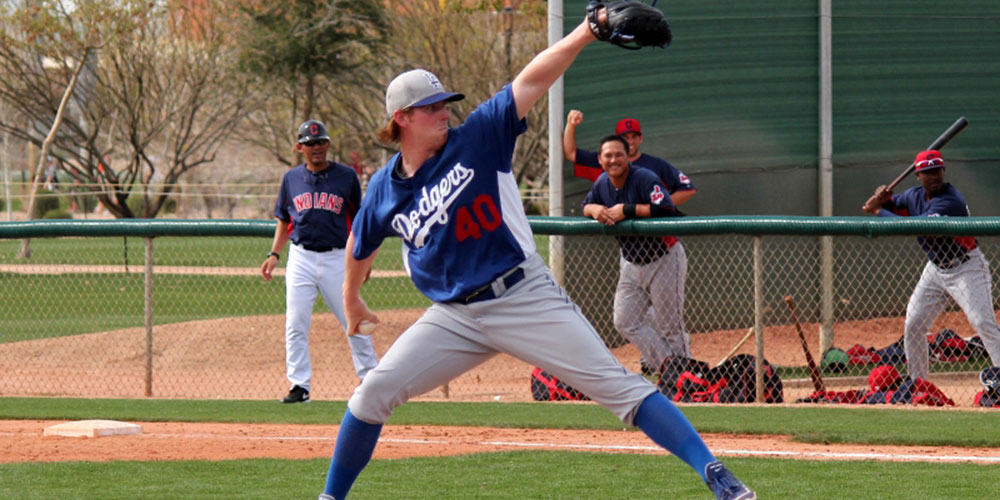Here I am again with another look back to random names from Dodger history. Last time it was a few players from the mid-2000s, which I started to think might not be far enough back. Then I realized it was actually half of my lifetime ago, which was a bit odd but gave me the excuse to keep using them for now.
This time I’m going to highlight a few incredibly short tenures with the franchise, including one name I had long forgotten until seeing it listed among the disastrous 2005 season.
The Dodgers traded for Ward ahead of the 2003 season, sending minor league pitcher Ruddy Lugo (brother of Julio Lugo) to the Astros for the corner outfielder and occasional first baseman. The Dodgers envisioned Ward as their fourth outfielder and backup first baseman, backing up Shawn Green, Brian Jordan and Fred McGriff.
Then-general manager Dan Evans said the Dodgers liked Ward’s power, adding the 49 home runs he hit for the Astros in more than 1,000 plate appearances showed he was “a guy that thrived a couple years ago in a role very similar to the role he’s going to have here.”
Ward never hit a home run in his 52 games for the Dodgers.
In 114 plate appearances, Ward managed a -1.1 WAR, a 8 wRC+ and an astounding .009 ISO. Ward’s only extra-base hit with the Dodgers came on June 22 when he doubled against the Angels, 86 plate appearances into his tenure. That double came as the Dodgers were forced to lean on Ward for a week, as McGriff landed on the disabled list for the first time in his 18-year career (to that point). Ward started six games at first base in an 11-day stretch, and less than a month later the Dodgers gave up on the experiment after trading for Jeromy Burnitz and seriously signing 44-year-old Rickey Henderson.
With Randy Wolf and Jeff Weaver clearly better in a similar range of at-bats, Ward might be the Dodgers’ worst hitter outside of pitchers since at least 1990.
I absolutely do not remember Edwards and won’t pretend that I do.
He finished 13th on the Dodgers with 258 plate appearances, leading to a .639 OPS, and was only beaten out by two of the Jasons (Grabowski, Phillips) for the worst WAR at -0.5. Joining the Dodgers with just six PAs two years earlier for the A’s, Edwards landed himself a spot in Los Angeles after finishing 2004 in Sacramento with an .816 OPS in Triple-A and a month in Las Vegas.
Somehow that led to Edwards splitting time at third base (with Oscar Robles, Antonio Perez, Jose Valentin and Willy Aybar) and left field (Ricky Ledee and Jayson Werth). That list of names probably makes it clear why Edwards was given as much run at third base as he was, which included 16 starts through September and October for a team that entered the final month of the season 12 games under .500.
Despite his oddly significant role, Edwards was released after 2005 and ended up with just 18 more PAs in the majors and was out of baseball after 2007.
While the two above had quick tenures in the majors, Patterson recorded just one day of major league service time when he appeared in 2014.
In need of a starter for the second game of a May doubleheader in Minnesota, the Dodgers added Patterson to the roster as the team’s 26th man. After allowing a run in the first, Patterson admirably worked into the fifth inning before being pulled with a pair of runners on base. Brandon League worked out of the jam and the Dodgers went on to win in 12 innings thanks to a Scott Van Slyke dinger and a sacrifice fly by Drew Butera.
Patterson’s first and final appearance in the majors came less than two weeks before his 27th birthday and after four years in the Dodgers’ organization following being drafted in the 29th round in 2010. Moving quietly through five of the Dodgers’ minor league levels in his first four professional seasons, Patterson outperformed his late draft slot.
Patterson ended up designated for assignment in September as the Dodgers opened up a roster spot for a returning Scott Elbert. After struggling in Triple-A for most of 2014 around his Los Angeles debut, Patterson underwent Tommy John surgery in January 2015 and missed the year. It took about 19 months for Patterson to return to the mound in Oklahoma City, where he struck out Nashville’s Max Muncy before giving up a pair of homers.
One last appearance for Oklahoma City ended with Patterson walking two, allowing two hits and one run in two innings of work. Two days later Patterson landed on the minor league disabled list and was quietly released two weeks later, with no appearances shown again.
 Dodgers Digest Los Angeles Dodgers Baseball Blog
Dodgers Digest Los Angeles Dodgers Baseball Blog
